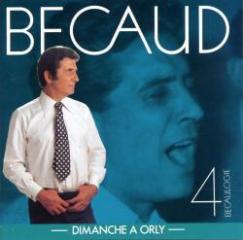Gilbert Becaud - Dimanche A Orly.Becaulogie.Vol.4 (1961–1964) [1988]
Gilbert Becaud - Dimanche A Orly.Becaulogie.Vol.4 (1961–1964) [1988]

1 Et maintenant play 2 La grosse noce 3 Le bateau blanc 4 Sur la plus haute colline 5 Fanfan 6 Le jugement dernier 7 Va t'en loin 8 Contre vous 9 De l'autre côté de la rivière 10 Je t'attends 11 Si je m'en reviens au pays 12 Quand Jules est au violon 13 Si j'avais une semaine 14 Les tantes Jeanne 15 Toi 16 Heureusement y'a les copains 17 Mon père est moi 18 Au revoir 19 Dis Mariette 20 Trop beau 21 Dimanche à Orly play
Bécaud was born François Gilbert Léopold Silly on October 24, 1927, in the Mediterranean port city of Toulon, France. He developed quickly as a pianist, and by age nine, he was already studying at the Conservatoire de Nice. Bécaud scored the biggest hit of his career in 1961 with "Et maintenant," a song he co-wrote with Pierre Delanoé that wound up ranking among French pop's all-time classics. Translated into English as "What Now My Love," it became a standard in America and Britain as well, recorded by Shirley Bassey, Sonny & Cher (a U.S. Top 20 hit in 1966), Frank Sinatra, Elvis Presley, Andy Williams, and countless others. He also scored another huge hit with "Je t'appartiens," which became a U.S. Top Ten hit for the Everly Brothers as "Let It Be Me"; the song was later recorded by soul singers James Brown and Jerry Butler, country star Willie Nelson, Elvis Presley, Bob Dylan, Nina Simone, and many more. Also known for "Un dimanche à Orly" (1963), the enormous hit "Nathalie" (1964; probably his second best-known song), "Quand il est mort le poète" (1965), the controversial pro-de Gaulle anthem "Tu le regretteras" (1965), and "L'important c'est la rose" (1967). Also, "Seul sur son étoile" was adapted into the English-language hit "It Must Be Him," which Vikki Carr took into the U.S. Top Five in 1967. ---All Music Guide
download (mp3 @192 kbs):
yandex 4shared mega mediafire zalivalka cloudmailru oboom uplea
Last Updated (Friday, 25 September 2015 08:50)








